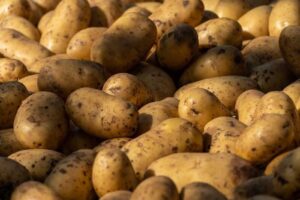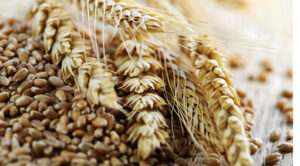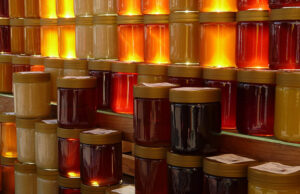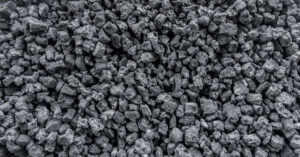
In 2023, the European Union imported 339.8 thousand tons of spices from non-member countries, according to the EU Statistical Office (Eurostat).
Over the past ten years, imports have increased by 44%.
Last year, China was the main supplier of spices, accounting for 39% of the total supply to the European Union, the report said.
The most popular spice was ginger (114 thousand tons), followed by paprika (110.6 thousand tons) and pepper (50.3 thousand tons). China was the main country of supply for ginger (43%) and paprika (73%), while pepper was mostly purchased from Vietnam (63%).
Turmeric ranked fourth (16 thousand tons), with the bulk of imports coming from India (79%). Cinnamon was in fifth place (13.3 thousand tons), with Vietnam accounting for more than a third of the supply (37%).
Over the past ten years, imports of turmeric and ginger have increased most significantly – by 2.4 times and 2.1 times. At the same time, purchases of pepper abroad decreased by 11%.

The harvest this year was far from planned, so Ukraine had to increase the supply of some vegetables. The volume of imports of potatoes has increased significantly, but other vegetables dismantle quite the opposite dynamics, writes SEEDS.
This was told by Bogdan Dukhnitsky, senior researcher of the Department of Agricultural Production Economics and International Integration of the National Research Center Institute of Agrarian Economics during the conference VeggiFruits. Processing of vegetables and fruits.
“According to the results of 10 months of 2024, there was a decrease in the value volumes of vegetable supplies to Ukraine, which affected their quantitative volumes. At the same time, imports of fruits and berries by their total value remained at the level of 2023.
As for the dynamics of import purchases for the first 10 months of 2024, in the vegetable group it is noteworthy that, although relatively insignificant, but from the base of last year there was an increase of 90% of potato purchases. This is due to the fact that the current year’s crop was far from the projected one.
While the rest of the vegetable items, which we had as a typical staple – onions, garlic, carrots, cabbage and cucumbers), are now showing a significant decline in imports. This is due to the fact that partly due to re-location and deformatization of specialization many enterprises managed to compensate for the significant decline, which we had in 2022,” – said the expert.
According to the expert, according to the results of January-October of this year, the geographical structure of vegetable supplies to Ukraine has a clear leader – it is Turkey. Also large in value volumes of supplies come to Poland and the Netherlands.
“In Ukraine, the standard production volume of all vegetables is about 10 million tons. In 2022, for obvious reasons, production fell significantly, it was 7.5 million tons. That is, 25% of the typical supply was not on the market. In 2023, Ukraine already produced more than 8 million tons of vegetables, and partially this demand was compensated.
Since 2022, as a result of a serious increase in import demand, vegetables were added to the key items in foreign purchases. This was also one of the reasons why in 2022 vegetables in Ukraine showed the largest price increase – plus 68%. This was the most expensive category. However, in contrast to them, fruits were on the list of the most expensive products, and remained there in 2023″, – says Bohdan Dukhnitsky.
In his opinion, in the next year, 2025, due to the existing circumstances, there is a high probability that the market in general will remain uncertain and high risks.
“Due to the fact that according to the results of this year’s harvest there was a significant decrease in quantitative and qualitative parameters for such positions as cabbage, apples, grapes, potatoes and some others, the need to import them remains and this also entails high prices. However, not specifically all these items in significant volumes. For example, for potatoes prices are now on average twice as high as they were a year ago.
However, despite all these circumstances, the supply in the domestic market of Ukraine, in its absolute majority still in the fruit and vegetable segment, in general and for specific products, primarily growing due to the natural and climatic features of our country, will be formed in the absolute majority of its own production, “ – said the expert.
Source: https://www.seeds.org.ua/ukraine-prishlos-uvelichit-import-kartofelya-na-90/

In January-October 2024, banks imported the equivalent of $12.88 billion in cash currency to Ukraine, which is 81.4% more than in the same period last year, according to statistics from the National Bank of Ukraine (NBU). The import of cash currency in the first ten months of 2024 is a record high since 2013, the only other record high was in the first 10 months of 2012, when the equivalent of $16.81 billion was imported. In particular, in October, banks imported the equivalent of $1.68 billion to Ukraine, compared to $1.30 billion in September and $1.09 billion in September.
According to the statistics, the US dollar and euro accounted for 68.3% and 31.6% of all imported cash in October, respectively, and 73.7% and 26.1% over the past 10 months.
Deliveries of dollars in October increased slightly compared to September, from $1.08 billion to $1.15 billion, while imports of euros almost doubled, from $229.6 million to $531.7 million.
As reported, since the beginning of 2024, the dollar has risen in price by 9.2%, or UAH 3.50, to UAH 41.5035/$1 at the official exchange rate, and by 13.5%, or UAH 4.93, since the National Bank switched to managed flexibility on October 3, 2023. Meanwhile, since the beginning of this year, the cash dollar has risen in price by about UAH 2.93 when buying to UAH 41.68/$, and by about UAH 2.33 when selling to UAH 41.75/$.

On the European market, prices for wheat and corn fell on Monday and Tuesday, while prices for rapeseed and soybeans may remain lower due to the escalation of hostilities in Ukraine last week, German publication Agrarheute.com reported.
Analysts say that the wheat market, which was supported by the escalation of the situation in Ukraine for most of last week, is under pressure due to the lack of new elements, the publication writes.
German experts attribute the decline in wheat and corn prices to the fall of the euro against the dollar: last Friday, its rate was recorded at $1.0333, a two-year low.
“The fall in the euro actually supports European wheat exports (and wheat prices) and slows down high imports of corn and rapeseed,” the resource noted.
Meanwhile, according to most analysts, the dominance of Black Sea wheat remains a factor that puts pressure on the European market, especially given the recent drop in Russian wheat prices. At the same time, wheat from the southern hemisphere is becoming increasingly important on the market.
Agrarheute referred to the data of the European Commission, according to which the European Union has already imported 3.5 mln tonnes of soft wheat since the beginning of 2024-2025 marketing year as of November 17, of which 2.5 mln tonnes, or approximately 70%, came from Ukraine, and the rest – from Canada, Moldova, the USA and Serbia. The main recipients were Spain (almost 2 million tons) and Italy (530 thousand tons).
“Starting December 1, Ukraine will introduce a system of minimum export prices for agricultural products, including wheat, corn and barley. Minimum prices will be calculated by the Ministry of Agrarian Policy on a monthly basis, and exports below these prices will be prohibited,” the publication noted.
Experts emphasized the difficulty of forecasting the situation on the global agricultural market due to the introduction of the mechanism of setting minimum export prices for agricultural products by Ukraine and its impact on the structure of the harvest and Ukrainian exports.
“We are quickly approaching the holiday season, which means there is less fundamental data to trade on the grain markets than we usually get in the rest of the year,” the publication quoted Kaden Sweeney, hedge strategist and market analyst at AgMarket.net, as saying.
Since the December USDA report is always similar to the November report, we probably won’t have any new supply and demand data until January 10, Agrarheute concluded.

Bulgaria’s Minister of Agriculture and Food Georgi Takhov asked the European Commission to take safeguard measures against honey imports from Ukraine at a meeting of the EU Agriculture and Fisheries Council, and his request was supported by a representative of Romania, the Bulgarian Ministry of Agriculture reported.
According to Takhov, imports of Ukrainian honey make it difficult to sell local products. The fact is that significant volumes of Ukrainian honey entering the European market at very low prices put a lot of pressure on Bulgarian honey prices.
“In addition to the many challenges facing the industry, over the past three years it has also faced competition from imports from Ukraine. The volume of honey imported from Ukraine to our country from January to October 2024 increased by more than 30% compared to the same period last year,” Takhov emphasized and added that the high level of imports from Ukraine puts Bulgarian producers in a difficult situation.
At a press conference following the meeting of EU agriculture ministers, Hungarian Agriculture Minister Istvan Nagy explained that Bulgaria and Romania demanded safeguard measures for imports of honey from Ukraine to the European Union, as the duty-free quota set in the autonomous trade liberalization has been exhausted, and “the duty creates problems in domestic markets burdened by imports.”
“The measure – the so-called ATM regulation – has been exhausted, but the amount of honey coming from Ukraine is still subject to duty, which also creates problems in domestic markets that are burdened by imports,” the Hungarian Ministry of Agriculture quoted him as saying.
Nagy emphasized that effective measures should be taken to prevent counterfeit honey from entering the EU market, for example, by labeling and separating natural and non-natural honey. He also believes that it is necessary to compensate for the “emerging competitive disadvantages” and to further support the beekeeping sector.
As reported, on August 20, the European Commission imposed tariff quotas on Ukrainian honey due to the excess of quota-free volumes of its supplies to the European market. Imports of honey from Ukraine from the beginning of 2024 to August exceeded the quota of 44.418 thousand tons. Additional imports are subject to most favored nation (MFN) duties. In particular, a new tariff quota will be introduced from January 1, 2025, until June 5, 2025, which corresponds to 5/12 of the threshold set for the emergency braking. For honey, the new quota will amount to 18,507 tons.
From June 2, 2024 to June 5, 2025, the European Commission introduced quotas for the supply of eggs and sugar to the European Union. For eggs, the new quota is set at 9,662 thousand tons, and for sugar – at 109,44 thousand tons.
On May 13, 2024, the Council of the European Union approved the extension of temporary trade liberalization measures for Ukraine for another year, until June 5, 2025. At the same time, it was envisaged to apply an emergency braking mechanism for particularly sensitive agricultural products, including sugar, eggs, poultry, oats, corn, honey, and cereals, in case imports of these products in 2024 exceed the average volumes recorded in the second half of 2021 and during 2022 and 2023. Similar emergency braking measures may be applied in 2025 if, in the period from January 1 to June 5, 2025, the volume of Ukrainian exports exceeds 5/12 of the quota set for 2024.
According to Art. 4(7) of the Regulation on autonomous trade measures applicable to Ukrainian products, Ukraine will be able to supply to the EU from June 6, 2024 to June 5, 2025 without paying any duty 57,101 thousand tons of poultry meat, 9,662 thousand tons of eggs, 109,439 thousand tons of sugar, 18,507 thousand tons of honey, 4.648 million tons of corn, 1,017 thousand tons of oats, 8,603 thousand tons of cereals.

In January-October this year, Ukraine increased imports of coke and semi-coke in physical terms by 2.16 times compared to the same period last year, up to 581,282 thousand tons.
According to the statistics released by the State Customs Service, coke imports in monetary terms increased by 97.9% to $208.879 million over the period.
Imports were mainly from Poland (84.12% of supplies in monetary terms), Colombia (8.73%) and Hungary (3.04%).
For ten months of the year, the country exported 1,593 thousand tons of coke for $366 thousand to Moldova (99.73%) and Latvia (0.27%), while in January, March, October-2024 there were no exports, while for 10 months of 2023 exports amounted to 3,324 thousand tons for $774 thousand.
As reported, in 2023, Ukraine reduced imports of coke and semi-coke in physical terms by 8.5% compared to 2022 – to 328.697 thousand tons, imports in monetary terms decreased by 25.8% to $129.472 million.
In 2023, Ukraine exported 3,383 thousand tons of coke, down 12.3% compared to 2022. In monetary terms, it decreased by 22.2% to $787 thousand.
Exports were carried out to Moldova (100% of supplies in monetary terms), while imports were mainly from Poland (88.47%), Colombia (7.72%) and the Czech Republic (3.15%).